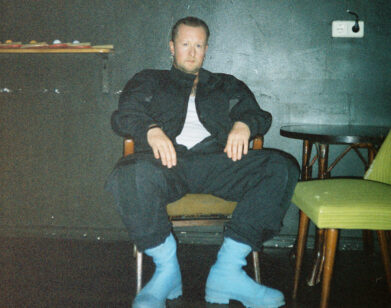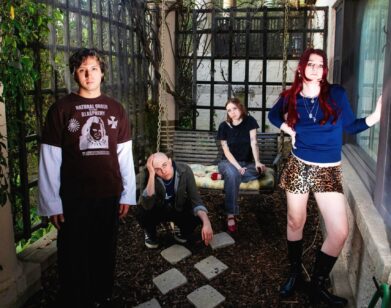Dan Deacon: Protest or Party?

“How creepy is that shit?”, remarked Dan Deacon, upon taking the stage earlier this summer at New York’s spanking new outdoor venue, Pier 84. The Wizard of Wham City’s derision was directed across the water at the hulking figure of the USS Intrepid, the aircraft carrier-turned-museum—something of a party-crashing presence at a show by a man whose progressive politics and disdain for military might are no secret. But Deacon soldiered, as it were, and hosted another night of the sort of participatory, hyperkinetic electronic ebullience with which he has become synonymous (plus the occasional hint of activist messaging).
Deacon’s spoken loudly and at length on globalization and the war on terror; his last album, the excellent, electro-tribal Bromst, was intended as an indictment of agribusiness goliath Monsanto; and he performed as part of Occupy Wall Street’s May Day rally in New York’s Union Square. And although it’s quite possible to party on with Deacon and tune out the words, which are often buried in the mix, he hopes you won’t do that. On America, his latest and most ambitious record to date, there’s more being said than ever, but you’ve got to dig to hear it. The single-packed Side A has gotten the most attention: another Deacon frenzied pop rush, but lyrically mostly dire and dystopian, with “Lots” partly taking its cues from Cormac McCarthy’s The Road. But it’s Side B, a stirring, sweeping 20-minute-plus suite called “USA,” that is the real triumph, evoking sea-to-shining-sea musical vistas.
It took a small village to make America—some 30 musicians on instruments including violin, bassoon, and player piano—and all of their names appear on the album cover, along with acid-trip images of Lake Placid and Bryce Canyon. It’s at once psychedelic and back to nature, contemporary classical and pop, not unlike the man who made the music. We talked to Dan Deacon on New York’s High Line about the importance of protest music, writing for orchestras, and why the presidential election shouldn’t be like an STD test.
JOHN NORRIS: Dan, this record has been gestating for a long time. I know that many of these songs have kind of existed in one form or another for several years, you spent six months tracking last year, and then all this time mixing. Are you at the point where it’s like “All right already, let’s get this out”?
DAN DEACON: [laughs] Yeah. The way I like to think about it is the record exists in stages; each stage is a different dimension where it starts to take shape. To me, the record existed a year ago in my head. And then it took a long time to make it exist in reality to the producer and musicians. And then the label got it, and the label hears it, and then you have the long-lead press, and then you have short-lead. You know what I mean? So it’s like a bacteria, it grows and grows until it takes over and then eventually someone comes and wipes it down with some cleanser and you start over again.
NORRIS: Well speaking of the press, is the talking about it something that is just a necessary evil, or do you actually enjoy that?
DEACON: I don’t dislike it. If there’s one thing I like talking about, it’s music. It’s nice to know that people are interested in it. Whenever I look at, say, old Sonic Youth or Beck interviews from that generation, those guys would be like, “Uh, yeah, I don’t know. It’s cool.” And I was never into that style. I mean no disrespect to those legends of the game, obviously.
NORRIS: You actually mentioned something similar to that on stage, about how artists back in the day would not be exactly into selling or promoting what they had done. Right?
DEACON: I think it went with the whole like Generation X thing of like, “Yeah, whatever, I don’t care.” And I don’t know, that whole attitude just, I feel very grateful for what I have. And the audience that was there, I don’t want them to think that I don’t give a crap, because I do. Obviously I give a crap.
NORRIS: I know you give a crap about the world and this country and how this country behaves in the world. And when I saw you walk out on stage, in particular to play songs from this album America, and you looked over at the Intrepid, the irony was clearly not lost on you.
DEACON: I knew as soon as I saw it I had to say something. I mean, this is a ship designed specifically for large-scale military operation. The ultimate example of the military-industrial complex. It’s a goddamn aircraft carrier in the middle of New York City! People go there and go, “Ooh, look at the glory of that!” There’s no glory in that.
NORRIS: Even though you’re a believer in protest music, in the live shows you don’t seem to want to oversell the message of the song. You’re low-key enough that you’ll say, “This is a song is called ‘Lots'” you don’t add, “And it was inspired by The Road, and I want you to know…”
DEACON: [laughs] Well, I don’t respond well to stuff like that, so I think that others don’t. No one wants to feel bad or stupid. Especially when they’re out having fun. The whole purpose of my shows is to make people feel like they’re in a safe environment and that they’re comfortable and that they can lose inhibition. And the moment you’re like, “Well, you know, really you’re responsible for a massive amount of slavery. But let’s party!”
NORRIS: [laughs]
DEACON: Still, you can’t think, “Oh, I’m responsible for all this slavery, and so are these people, and I don’t really like it, but… Oh well, fuck it. No one really cares, right? We don’t have to actually see the slaves. They’re in other countries! They’re in parts of the city that I don’t go to!”
NORRIS: But a lot of those kids, isn’t that their default attitude anyway? If I don’t see it, it doesn’t exist?
DEACON: Yeah, but I think it was made that way by the mainstream media and record labels, and the government. I mean, look at the power that pop music had in the ’60s and ’70s in regards to the Vietnam War and the civil rights movement. A massive effect. Back then, it was crazy if fans weren’t political. It motivated an entire generation. And obviously someone saw that correlation, like with John Lennon getting deported and eventually assassinated. But I do think there was a conscious effort to make protest music so culturally undesirable. And I’m not saying, “And now let’s take out our notepads and all write down all the reasons why we’re horrible people, and then when we’re done we’ll get back to dancing.” But the challenge I’m battling right now is how can I make my shows not just pure escapism.
NORRIS: You know, that title America—that’s obviously a charged word. I try to avoid calling this country America.
DEACON: I do call this country America. It was a very cognizant decision to call the B-side “USA” and the album America. To me, “America” is an idea. And I guess it still goes hand in hand with imperialism, but it’s very different—”America” is very different than “United States.”
NORRIS: Right!
DEACON: You can say “America” in Europe and they go, “You mean the States.”
NORRIS: Exactly.
DEACON: Okay, sure, but I’m not United States-ian. And if I told you someone burned the American flag, you wouldn’t say, “Are you talking about the flag from Brazil?” Do you know what I mean? I don’t really think Brazilians would refer to themselves as Americans, they would refer to themselves as Brazilians. Yes, South America is just as much America as the United States, Canada is just as much America, but the word “America” has come to mean, to a vast population of the world, the United States. And to a lot of people that’s controversial, but again that goes hand-in-hand with the whole concept of what this country is.
NORRIS: There are nearly 30 musicians on this record, from violin to bassoon—is that the way it’s gonna be from now on, do you think? Or do you see yourself going back to just a you-and-synths more kind of approach?
DEACON: I like working with as many timbres as possible. I think the main thing that pushes electronic musicians is to be able to create sounds. And to be able to have limitless ability to manipulate them, their speed and their volumes can change drastically. But I’m also very into the limitations of acoustic instruments and of human players. As much as I’d love to write for an orchestra, being as I’ve only had one opportunity to do it, I’d love to do more of it, but it isn’t a complete sound to me. That isn’t what I strive to do. I just strive to make the music that is in my head become a reality, and electronics will always be a part of that. I would love to write an acoustic record, but to do so I would have to deliberately almost subdue the music to make it a reality. Because I love sine waves, and sine waves—even a flute, the most sinusoidal-sounding acoustic instrument, still isn’t a sine wave.
NORRIS: You have told me in the past that in some ways it doesn’t matter who wins this upcoming election. But you must hope that Obama pulls through.
DEACON: Here’s the deal. It’s not like when you go to get an STD test, it’s like “God, I hope it’s chlamydia, not AIDS.”
NORRIS: [laughs]
DEACON: Do you know what I mean? You can’t go into it thinking, “Oh God, I hope it’s just like, a lesser kind of scary cancer!” You can’t think like that. I mean, yes, I hope Mitt Romney is not gonna be President of the United States. But if Obama wins, I hope he is the Obama that we see on the HOPE poster, and not the Obama that we see being interested in SOPA [the Stop Online Piracy Act] or indefinite detention, or the huge warmonger that we’ve seen for the past four years. And Obama’s supporters need to hold him accountable.
NORRIS: Thanks, Dan. America is a truly amazing record. I hope everyone not only gets to hear it and gets into the shows, but I hope maybe they get into what’s going on, on a deeper level.
DEACON: Thanks, man, I hope so, too. And for some people, it’ll take a little bit longer than others. When I was in my 20s, the last thing I wanted to think about was the future, because I was hoping the world would end in four months. But I don’t really have that mindset anymore. I used to actually hope that the world would end. And now I so hope it doesn’t.
DAN DEACON’S AMERICA IS OUT NOW; FOR MORE, VISIT HIS WEBSITE. YOU CAN SEE JOHN NORRIS’ VIDEO INTERVIEW WITH DEACON THIS WEEK ON NOISEVOX.






